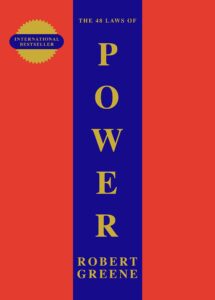How I Stumbled Upon the 48 Laws of Power
I wasn’t exactly looking for a book on power.
In fact, I picked up The 48 Laws of Power by Robert Greene during a lazy Sunday scroll through a recommended list of bestselling self-help books. At first glance, the title felt…intense. Was I really about to read a book about manipulation and control?

But something about the way readers described it — raw, unapologetic, brutally honest — intrigued me. I was navigating some tricky dynamics at work and in my personal relationships. The idea of understanding power dynamics didn’t seem so bad after all.
Little did I know, I was about to go on a journey that would completely shift the way I understood influence, leadership, and even trust.
What is the 48 Laws of Power Really About?
At its core, The 48 Laws of Power is a manual for mastering human behavior.
Robert Greene draws from centuries of history — referencing figures like Machiavelli, Napoleon, and Sun Tzu — to present 48 unapologetic laws that show how power operates in the real world. Some laws will make you nod. Others might make you uncomfortable.
But every single one will make you think.
Key Lessons from the 48 Laws of Power
Let me walk you through a few laws that struck a personal chord and how I saw them play out in real life.
Law 1 – Never Outshine the Master
Sounds obvious, right? But how many times have we unknowingly threatened a superior with our enthusiasm or intelligence?
I once offered a bold idea in a team meeting. It was good — so good, in fact, that my manager brushed past it and shifted the focus. Later, I read this law and realized: sometimes, it’s not just what you say, but who needs to say it.
Law 3 – Conceal Your Intentions
This one helped me in negotiations. Whether you’re trying to get a better deal or plan a career move, not showing all your cards can be a powerful advantage. Greene’s insight here reminded me that strategy isn’t about deception — it’s about timing.
Law 6 – Court Attention at All Costs
As a content creator and reader, this resonated deeply. In today’s noisy world, staying quiet means disappearing. From social media to professional pitches, making a mark means commanding attention — thoughtfully.
Why the 48 Laws of Power Isn’t for Everyone (And That’s Okay)
Some people find the book manipulative. And to be fair, Robert Greene’s book doesn’t hold back. It reveals the underbelly of power — the moves people make that aren’t always ethical but are undeniably effective.
But for me, this wasn’t about copying the laws blindly. It was about awareness.
If you understand the game, you don’t get played.
Whether you’re navigating a toxic workplace, building a brand, or just learning how to improve communication skills, this book offers timeless insights — sometimes harsh, always thought-provoking.
How I Use These Laws in My Life Today
I don’t follow every law. But I carry them with me like tools in a box — taking one out when I need it.
In conflicts, I remember Law 15: “Crush your enemy totally.” (Interpretation: don’t leave loose ends.)
In creative work, Law 25: “Re-create yourself” keeps me evolving.
In public speaking, I draw from Law 6 and Law 34: “Be royal in your own fashion.”
The beauty of The 48 Laws of Power is that it doesn’t tell you what’s right or wrong — it tells you what works. And that, to me, is priceless.
Should You Read the 48 Laws of Power in 2025?
Absolutely — especially if you’re looking to:
Understand human behavior
Strengthen leadership skills
Learn real-world strategies from history
Explore one of the most talked-about self-help books
Pair this read with something like my blog on books to improve communication skills to balance strategy with emotional intelligence.
Final Thoughts – Power Isn’t Always About Control
Reading The 48 Laws of Power changed how I see the world — not in a sinister way, but in a smart one.
Power is everywhere — in our relationships, our words, our silences. Whether you use it to lead, create, or protect, understanding it makes you stronger.
What Do You Think About Power?
Have you read The 48 Laws of Power? Which law surprised or helped you the most? Or do you think power should be handled differently?
Let’s talk about it in the comments — I’d love to know how you interpret power in your world.
